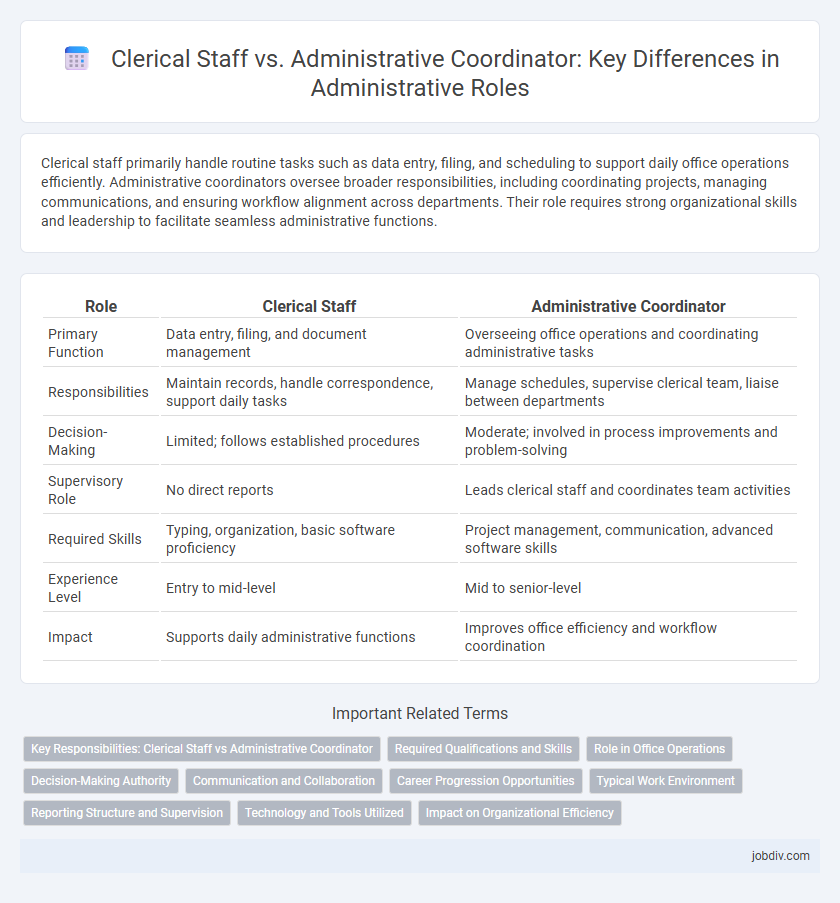Clerical staff primarily handle routine tasks such as data entry, filing, and scheduling to support daily office operations efficiently. Administrative coordinators oversee broader responsibilities, including coordinating projects, managing communications, and ensuring workflow alignment across departments. Their role requires strong organizational skills and leadership to facilitate seamless administrative functions.
Table of Comparison
| Role | Clerical Staff | Administrative Coordinator |
|---|---|---|
| Primary Function | Data entry, filing, and document management | Overseeing office operations and coordinating administrative tasks |
| Responsibilities | Maintain records, handle correspondence, support daily tasks | Manage schedules, supervise clerical team, liaise between departments |
| Decision-Making | Limited; follows established procedures | Moderate; involved in process improvements and problem-solving |
| Supervisory Role | No direct reports | Leads clerical staff and coordinates team activities |
| Required Skills | Typing, organization, basic software proficiency | Project management, communication, advanced software skills |
| Experience Level | Entry to mid-level | Mid to senior-level |
| Impact | Supports daily administrative functions | Improves office efficiency and workflow coordination |
Key Responsibilities: Clerical Staff vs Administrative Coordinator
Clerical staff primarily handle routine tasks such as data entry, filing, and managing correspondence, ensuring smooth daily office operations. Administrative coordinators oversee project coordination, resource allocation, and communication between departments, enhancing organizational efficiency. Both roles require strong organizational skills, but administrative coordinators take on higher-level planning and decision-making responsibilities.
Required Qualifications and Skills
Clerical staff typically require basic qualifications such as a high school diploma or equivalent, strong organizational skills, and proficiency in office software like Microsoft Office and data entry tools. Administrative coordinators often need advanced qualifications, including a bachelor's degree in business administration or related fields, project management capabilities, excellent communication skills, and experience with scheduling, budgeting, and team coordination. Both roles demand attention to detail and multitasking abilities, but administrative coordinators require deeper expertise in managing complex office operations and strategic planning.
Role in Office Operations
Clerical staff manage routine tasks such as data entry, filing, and scheduling to ensure smooth daily office operations. Administrative coordinators oversee these activities while coordinating between departments, managing projects, and implementing office policies to optimize workflow. Their role involves strategic planning and problem-solving to enhance overall office efficiency and communication.
Decision-Making Authority
Clerical staff primarily handle routine tasks such as data entry, filing, and scheduling with limited decision-making authority. Administrative coordinators possess greater decision-making power, overseeing office operations, coordinating projects, and managing staff assignments. Their role involves strategic problem-solving and implementing organizational policies to ensure workflow efficiency.
Communication and Collaboration
Clerical staff primarily handle routine communication tasks such as managing correspondence, scheduling appointments, and maintaining records to support organizational operations efficiently. Administrative coordinators oversee more complex communication workflows, facilitating cross-departmental collaboration and ensuring information flows smoothly among teams and stakeholders. Effective collaboration hinges on the coordinator's ability to integrate various communication channels, streamline processes, and foster team cohesion within administrative functions.
Career Progression Opportunities
Clerical staff often begin with fundamental tasks such as data entry, filing, and scheduling, which build foundational office skills essential for career advancement. An Administrative Coordinator typically assumes greater responsibility by overseeing team workflows, managing projects, and facilitating communication across departments, making this role a strategic step up from clerical positions. Career progression from clerical staff to administrative coordinator involves acquiring advanced organizational, leadership, and problem-solving skills that enhance opportunities for managerial roles within administration.
Typical Work Environment
Clerical staff typically work in structured office settings where tasks involve data entry, filing, and general office support, often under direct supervision. Administrative coordinators operate in dynamic environments that require multitasking between staff coordination, project management, and communication with multiple departments. Both roles demand proficiency with office technology and adherence to organizational policies, but administrative coordinators engage more frequently in decision-making and cross-functional collaboration.
Reporting Structure and Supervision
Clerical staff typically report to mid-level supervisors or departmental managers who oversee daily administrative tasks and provide direct guidance. Administrative coordinators often have a broader reporting structure, liaising with senior management to ensure alignment across multiple departments while supervising clerical staff and workflow coordination. The administrative coordinator's role includes performance evaluation and task delegation, positioning them as a key intermediary between clerical personnel and executive leadership.
Technology and Tools Utilized
Clerical staff typically utilize basic office tools such as Microsoft Office Suite, data entry software, and scheduling applications to manage routine tasks efficiently. Administrative coordinators, however, leverage advanced project management platforms like Asana or Trello, CRM systems, and specialized communication tools to coordinate complex workflows and enhance team collaboration. Proficiency in cloud-based technologies and automated reporting software further distinguishes administrative coordinators in optimizing organizational operations.
Impact on Organizational Efficiency
Clerical staff streamline organizational efficiency by handling routine tasks such as data entry, filing, and correspondence, ensuring smooth daily operations. Administrative coordinators enhance this impact by overseeing multiple departments, coordinating projects, and implementing process improvements that optimize workflow. Their strategic role bridges operational execution and management, significantly boosting overall productivity and resource allocation.
Clerical Staff vs Administrative Coordinator Infographic

 jobdiv.com
jobdiv.com